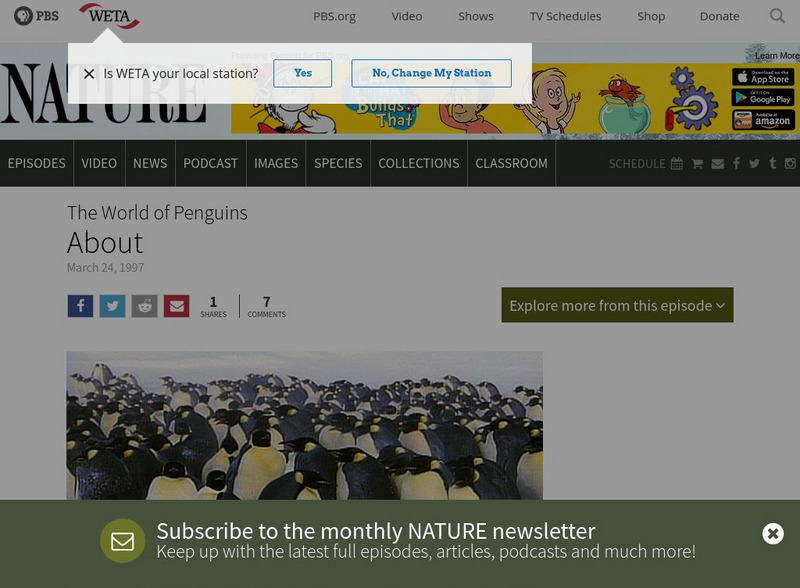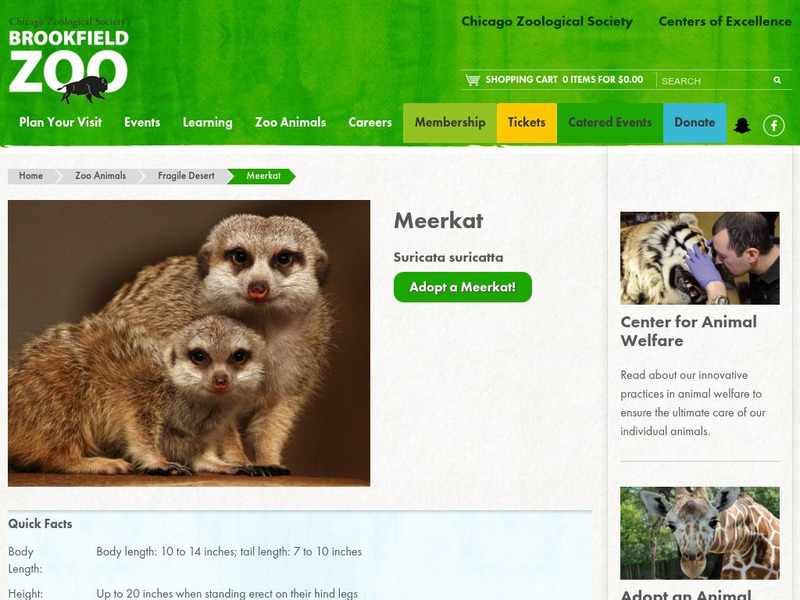PBS
Pbs: Nature: Panda Bears
What bear is considered China's national treasure? This site features a brief description of the life of a panda bear.
PBS
Pbs Nature: Otters
Discover more about how otters live, what they eat and how they socialize when you visit this informative resource. This condensed site will benefit students who need help narrowing their research information.
PBS
Pbs: Nature: The World of Penguins
What do you know about the world of penguins? This PBS site features information about these flightless birds. Come and check out this extraordinary resource.
Curated OER
Merriam Webster: Visual Dictionary Online: Bat Morphology
Labeled diagram of the morphology, or structure, of a bat.
Curated OER
Merriam Webster: Visual Dictionary Online: Rodents
Labeled diagram of a several common rodents.
Chicago Zoological Society
Chicago Zoological Society: Zoo Explorer: Meerkat
Find out more about the meerkat by browsing this reference from the Brookfield Zoo. In addition to quick facts, this animal guide provides information on its appearance, classification, social habits, communication, and breeding habits.
Chicago Zoological Society
Chicago Zoological Society: Zoo Explorer: Mexican Gray Wolf
Get acquainted with the Mexican gray wolf by browsing this one-page article from the Brookfield Zoo. This animal guide includes quick facts and information on its classification, communication skills, and family traits.
Wonderville Media
Wonderville: Sea Turtles
Sea turtles are one of the earth's oldest animals living in the ocean. They have been around since the time of the dinosaurs. That's over 100 million years! Sea turtles are different from land turtles in two primary ways. Learn about Sea...
Wonderville Media
Wonderville: Sharks
There are over 400 different species of sharks that live in the earth's oceans. Most sharks live in mild or warm parts of oceans. However, there are a few that live in cold waters, like the Greenland shark, which lives in the Arctic, and...
Wonderville Media
Wonderville: Baboons
Baboons have incredible vocal chords, and they can make more than 30 distinct noises, from short grunting sounds to full-blown screaming. Learn more about Baboons in this well-constructed overview by Wonderville.
Wonderville Media
Wonderville: Chimpanzees
Chimpanzees are loud, smart, and very social creatures. They have big bodies with long arms, short legs, and strong hands that allow them to easily grab a variety of objects. Chimpanzees can be found in Eastern Africa. They spend just...
Wonderville Media
Wonderville: Crocodiles
Crocodiles are among the largest reptiles in the world, and they are also some of the most dangerous creatures on the planet. Crocodiles and their close relative, the alligator, are responsible for more human deaths each year than any...
Wonderville Media
Wonderville: Fish
You cannot "pet" a fish, but it is good company. You can watch it swim and play. You can talk to it, even if it won't talk back. Some fish react to a friendly voice or face! There are many kinds of fish. No matter what kind you have,...
Wonderville Media
Wonderville: Honey Bees
Honey bees are a very important part of nature. We all know that honey comes from bees, but what else do you know about honey bees? Learn more about Honey Bees in this well-constructed overview by Wonderville.
Wonderville Media
Wonderville: Deep Sea Creatures
We all know that the ocean is home to many beautiful and mysterious creatures. Mysterious cannot begin to describe the fish living in the depths of the ocean. Imagine the kind of creature that lives thousands of feet underwater! Sunlight...
Wonderville Media
Wonderville: Aardvarks
The aardvark looks a bit like a pig. Its body is stout, with an arched back, and is sparsely covered with coarse hairs. Its legs are medium length. Its front feet have four toes, while the back feet have five toes. Each toe has a large,...
Wonderville Media
Wonderville: African Lions
The African lion is at the top of the food chain and is often called "the king of the jungle." It is the biggest carnivore in Africa and remains one of the most feared predators on the planet. Lions are well known for their courage and...
Wonderville Media
Wonderville: African Elephants
African elephants are the biggest land animals on the planet, standing up to 13 feet tall and weighing as much as 14,000 pounds. They are even bigger than their elephant cousins in Asia. You can tell them apart because their ears...
Wonderville Media
Wonderville: Colobus Monkeys
The Eastern black-and-white colobus monkey is known for its cape of white hair in the shape of a "U" from the shoulders to the lower back. This is called their mantle. They also have long, white hairs around their face and on their bushy...
Wonderville Media
Wonderville: Galagos (Bushbabies)
Bushbabies are incredible jumpers, and they can hop across distances as great as 20 feet, tucking their arms and legs against their bodies. Learn more about Galagos (Bushbabies) in this well-constructed overview by Wonderville.
Wonderville Media
Wonderville: Hamsters
Do you have a hamster? There are several different kinds of hamsters. No matter what kind you have, your hamster has needs. Now it is your job to meet your pet's needs! Learn more about Hamsters in this well-constructed overview by...
Wonderville Media
Wonderville: Birds
Congratulations! You have a new pet bird. Maybe it's a tiny parakeet. Maybe it's a bigger cockatiel or parrot. No matter what kind of bird you have, it has needs. And now it is up to you to meet your pet's needs! Learn more about Birds...
Curated OER
Merriam Webster: Visual Dictionary Online: Head of a Poisonous Snake
Illustration of the head of a poisonous snake, with callouts for its fangs, venom gland, and other parts.







